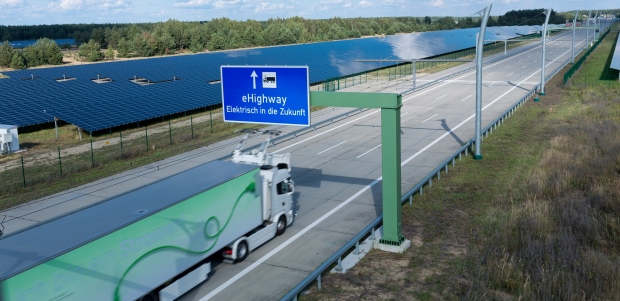
First 'eHighway' Demonstration Project Under Way
Siemens and the South Coast Air Quality Management District are managing a 1-mile, zero-emission demonstration in Carson, Calif., this month. Three field trials of the eHighway technology on German highways are planned for 2019.
Siemens and the South Coast Air Quality Management District are managing a 1-mile, zero-emission demonstration project in Carson, Calif., near the ports of Los Angeles and Long Beach, that began this month. Three field trials of the same eHighway electrification technology on German highways are planned for 2019.
Three trucks hauling freight are running along the stretch of highway that uses Siemens technology to electrify select highway lanes via an overhead catenary system. The system supplies the trucks with electric power in the same way modern-day trolleys or streetcars are powered on many city streets; according to Siemens, the system also allows for truck operation outside the electrified sections of infrastructure.
Large trucks are the leading source of smog-forming emissions in Southern California, so developing a zero- or near-zero way to move cargo in the ports is a prime objective. "This project will help us evaluate the feasibility of a zero-emission cargo movement system using overhead catenary wires," said Wayne Nastri, SCAQMD's executive officer. "This demonstration could lead to the deployment of eHighway systems that will reduce pollution and benefit public health for residents living near the ports."
"Every day, Americans rely on the goods and services that are carried by freight. This mode of transportation is predicted to double global CO2 emissions by 2050," said Roland Edel, chief technology officer of the Siemens Mobility Division. "Our eHighway technology has the capacity to double efficiency in comparison to regular diesel-powered trucks. This in turn cuts energy consumption in two and reduces local air pollution around America's largest harbors."
The two partners said this month that a battery-electric truck, a natural gas-augmented electric truck, and a diesel-hybrid truck are driving on a one-mile catenary system on the north- and south-bound lanes of South Alameda Street from East Lomita Boulevard to the Dominguez Channel in Carson. The system is expected to lower fossil fuel consumption, reduce truck operating costs, substantially reduce smog-forming emissions, and help accommodate the growing reliance on freight transportation.
Three field trials of the same technology on German highways are planned to start operation in 2019, according to Siemens.
The California project, at a cost of $13.5 million, is being funded with $2.5 million from SCAQMD, $4 million from a settlement with China Shipping, $3 million from the California Energy Commission, $2 million from the Port of Long Beach, and $2 million from LA Metro, and Siemens provided a $1.3 million in-kind contribution. SCAQMD is providing an additional $2.1 million and EPA is providing $500,000 for the TransPower contract. Under a separate contract with SCAQMD, the natural gas hybrid and electric trucks have been developed by Escondido-based TransPower and the diesel hybrid was developed by Volvo's subsidiary, Mack Trucks.